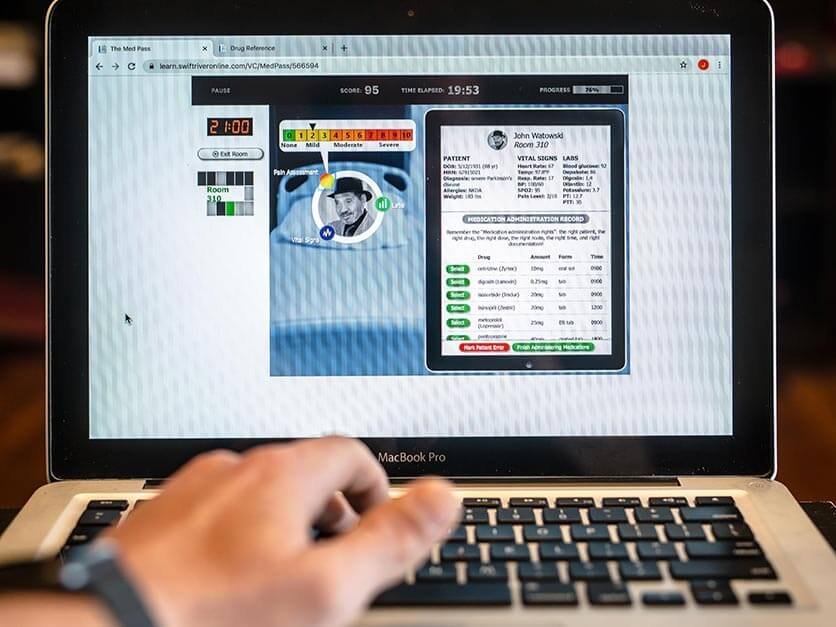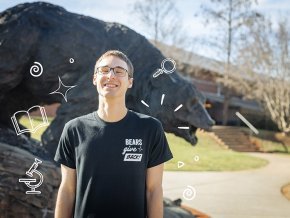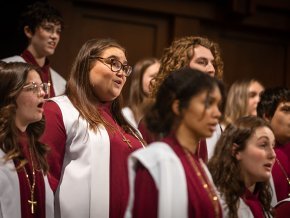LR nursing students to simulators facing COVID-19

Due to the COVID-19 pandemic, LR nursing students were forced to complete their clinical rotations online using simulators.
In the midst of a worldwide pandemic, life has been altered for many, including Lenoir-Rhyne University students.
Just weeks before completing their final semester, senior nursing students such as Jake Pierce are finishing their studies remotely while preparing themselves to be reinforcements to a health care system besieged by new cases of COVID-19.
"In the last semester, they [faculty] are preparing us for the job and real life," Pierce said. "They've done most of the content and prepared us, but we're working on polishing our skills, priming to take boards, passing exams and being prepared for where we're going to work."
A key element to that preparation is the final clinical rotations where students see patients. Pierce's rotation was at Wake Forest Baptist Health.
However, when classes moved to remote learning over spring break, that also marked the end of in-person clinical rotations for nursing students, which left some scrambling to get their required hours.
"Under North Carolina rules, as long as you have 120 contact clinical hours within the last year and have met all of the objectives of the clinical courses, we are allowed to graduate," Pierce said. "Faculty have assisted all senior students with meeting these requirements by allowing us to simulate the remaining requirements."
Typically, students are required to get 120 hours in acute preceptorship in the spring; however, that has been adjusted given the extraordinary circumstances of the COVID-19 pandemic.
"The North Carolina Board of Nursing acted on April 6, 2020, to allow each program director to be responsible for determining educationally sound modifications that are necessary, for identifying whether program outcomes have been met and for validating that all students who meet the program outcomes are eligible to apply to take the NCLEX-RN (National Council Licensure Exam for the Registered Nurse)," said Dr. Kerry Thompson, chair of the LR School of Nursing. "All Lenoir-Rhyne 2020 nursing seniors are meeting the requirements set forth by faculty and are on track to graduate in May."
A few students in his class had finished all 120 of their hours prior to the shutdown, but the majority have turned to online simulations using a program called Swift River Virtual Hospital where they're presented with patient scenarios and tasked with determining the proper course of treatment.
Pierce said some of his classmates strung together up to three 12-hour shifts in the second week of LR's extended spring break to reach the required hours.
"Usually, when we do simulations, we run through it with an instructor and have someone pretend to be a patient," Pierce said. "We chart like you do in the hospital, and we go over what you'd do for a patient.
"Over spring break, they looked into an online program and did a lot of research on what would be the best option. That's how they came up with Swift River."
In the program, students are presented with activities where they hear a case. Then they have to choose the correct objective and course of treatment. Each activity can take up to two hours, and six activities count as a 12-hour clinical day. Students are required to meet a certain standard with their answers, and this requires a lot of research, medication calculations, prioritization and delegation critical thinking.
Pierce said the program has been helpful, although not the same as direct patient experience.
"It's not the same as being in person and what our faculty can put together, but it's about as close as you can get," he said.
Another plus is the ease and availability of use. Prior to the shutdown, Pierce was working 7 p.m. to 7 a.m. shifts at Wake Forest. Due to program recommendations, however, he was prevented from working a night shift and then coming in to class, which limited the days he could attend clinicals. With Swift River, he can log on as free time permits.
"It's definitely tough, but I think it isn't as difficult as junior year when you have intense experiences and exams," he said. "That is really the make-or-break time. By the time you get to your senior year, you're a little more seasoned and can adapt a little more."
While Pierce and his classmates still have to finish their last hours and pass their final exams, every member of the class has been offered and accepted a position at hospitals throughout the state.
In Pierce's case, he accepted a position at Duke University Hospital in the surgical intensive care unit.
"They need nurses very badly right now," he said. "They know when you come out of a school like LR, that has a great reputation for its nursing program, those are the people they want to grab first."
Hospitals are on the list of essential businesses exempt from Governor Roy Cooper's stay-at-home order, but the testing centers where health care workers take their board exams and have background checks performed are not.
"We can't take our boards, which gives us our license," Pierce said. "But as long as we graduate with the approval of our facility and the director of our program, we can practice within the full scope of our license, as long as we're under the supervision of someone on our floor. Then when everything gets back to normal, we'll take our boards."
The nursing school at Lenoir-Rhyne, which is fully accredited by Commission on Collegiate Nursing Education, was founded in 1960 as the fourth such program in the state of North Carolina and the first faith-based college or university to be accredited. The three-year national licensure exam first-time pass rate among LR graduates is 94 percent.
* Photo courtesy of Jake Pierce

Lenoir-Rhyne offers students opportunities to grow in themselves and give back to their communities. Hagan Suchocki '25 has embraced those opportunities with unmatched enthusiasm.
View More
The tour will revive a planned itinerary from 2020, traveling from North Carolina to Virginia, Maryland, Pennsylvania and New York.
View More